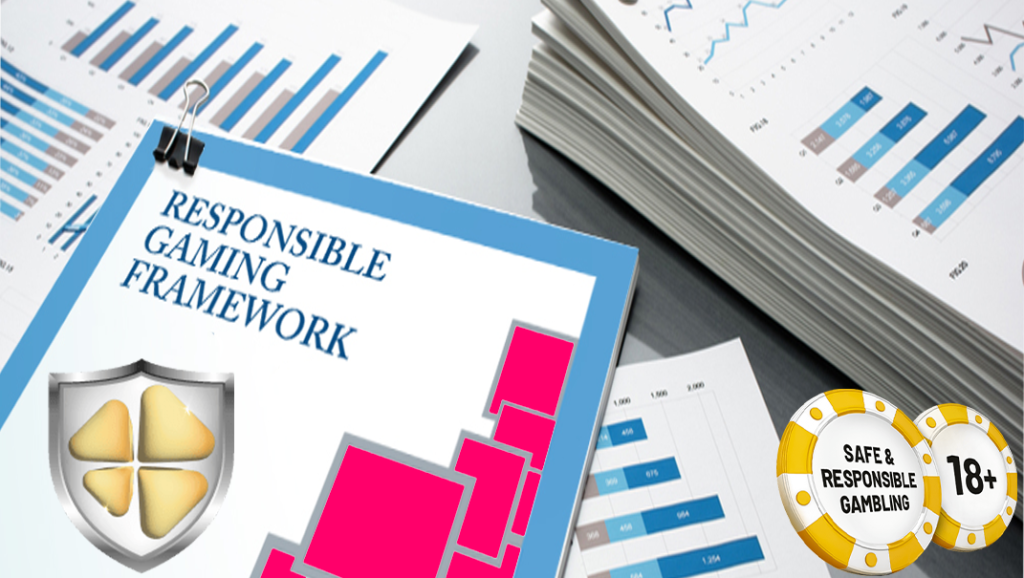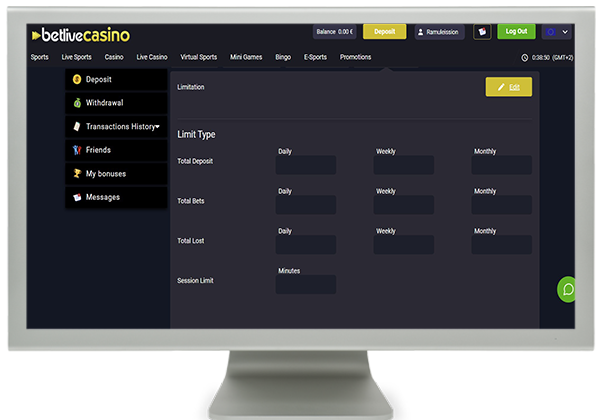Player Protection In Online Gambling Today
Player protection in online gambling in 2024 encompasses a broad range of strategies and regulations designed to safeguard individuals engaging in online casinos. This protection is crucial due to the multifaceted risks associated with online gambling, including addiction, significant financial loss, and exposure to fraudulent activities. As the online gambling industry continues to grow in 2024, so too does the importance of implementing robust player protection measures.

The Importance of Player Protection in Online Casinos and Online Gambling
Online casinos, while providing entertainment and potentially lucrative opportunities, can also pose serious threats to players who are unprepared or unaware of the potential pitfalls. Compulsive gambling remains a critical issue; without proper safeguards, individuals may find themselves facing severe emotional and financial distress. Moreover, the digital nature of online gambling platforms increases the risk of cyber fraud and unauthorized access to personal and financial information. This potential for exploitation necessitates stringent measures to ensure player safety.

Addressing these concerns, regulatory bodies worldwide have developed frameworks aimed at mitigating risks and ensuring fair play. Licensing requirements, age verification processes, and self-exclusion options are all part of the toolkit used to protect players. Effective regulations mandate that online gambling operators adhere to strict standards, thereby fostering a safer gambling environment. Additionally, the incorporation of responsible gambling tools, such as deposit limits and time-outs, provides players with mechanisms to manage their gambling activities more effectively.
Understanding and implementing effective player protection protocols is not only a legal necessity for online casino operators but also an ethical one. This commitment to player welfare is fundamental in cultivating a trusted and dependable online gambling ecosystem. As the conversation on player protection advances, it becomes evident that safeguarding players is an essential element in sustaining the integrity and sustainability of the online casino industry.
Risks Associated with Online Gambling
Engaging in online gambling presents a multitude of risks that can profoundly impact a player's well-being. One of the most prominent concerns is gambling addiction, which can escalate quickly given the ease of 24/7 access to online casinos. The perpetual availability and sophisticated design of these platforms often lead players to spend more time and money than initially intended, spiralling into addictive behaviours. Consequently, gambling addiction may result in severe financial problems, where individuals deplete their savings or incur significant debt, struggling to meet day-to-day living expenses.
Mental health concerns also emerge as a critical issue tied to online gambling. The constant stress of financial loss, coupled with feelings of guilt and failure, can lead to anxiety, depression, and other psychological issues.
Furthermore, the isolation that often accompanies excessive online gambling can exacerbate these mental health problems, creating a cycle that is difficult to break without proper support and intervention.
Exposure to fraud is another significant risk for players engaging in online gambling. Unscrupulous websites and fraudulent operators can exploit players by rigging games, withholding payouts, or stealing sensitive personal and financial information. This not only leads to financial loss but also undermines trust in the online gambling ecosystem.

Data security risks cannot be overlooked in the realm of online gambling. Players are required to share confidential information, such as credit card details and personal identification, leaving them vulnerable to cyberattacks and data breaches. Inadequate security measures can lead to the misuse or theft of personal data, causing both financial and identity theft risks. Given these substantial risks, implementing robust player protection measures is indispensable. By highlighting the potential dangers, it becomes evident that the online gambling industry must prioritize the safety and security of its participants to foster a more responsible and trustworthy gambling environment.
Regulations and Legal Frameworks
The regulatory landscape for online gambling is multifaceted, encompassing both national and international levels of oversight. Players' protection is a fundamental aspect that these regulatory frameworks aim to reinforce, ensuring fair and secure gambling experiences. Various governmental and non-governmental bodies play crucial roles in the enforcement of these laws, licensing procedures, and maintaining compliance requirements.
At the national level, jurisdictions such as the United Kingdom, through the UK Gambling Commission (UKGC), have established robust regulations that govern online casinos and gambling platforms. The UKGC mandates stringent licensing processes, ensuring only operators who comply with their regulations can legally offer services to players. The regulations cover aspects such as ensuring fair gaming, responsible advertising, and measures to prevent money laundering, all geared towards player protection.
Internationally, regulatory bodies like the Malta Gaming Authority (MGA) and the Kahnawake Gaming Commission offer oversight and licensure to gambling operators. The MGA, recognized for its rigorous standards, provides a reliable framework that numerous companies adhere to, thereby ensuring players' rights and security are well-protected. Similarly, the Kahnawake Gaming Commission, operative for over two decades, emphasizes transparency and fairness in the gaming industry.
Non-governmental organizations also contribute significantly to the regulatory environment. Groups like eCOGRA (eCommerce and Online Gaming Regulation and Assurance) offer certification that operators meet high standards of fairness and safety. eCOGRA’s seal of approval provides players with an added layer of assurance that the platform they engage with adheres to established industry standards.
Player protection is underscored through various compliance requirements. These include features such as self-exclusion options, deposit limits, and identity verification processes designed to prevent underage gambling and fraud. Licensing bodies regularly audit operators to ensure continuous compliance with regulations, contributing to safer online gambling environments.
Example regulations from other regions, such as Australia’s Interactive Gambling Act and Sweden’s Gambling Act, further exemplify the global push towards a regulated and secure gambling framework. These laws emphasize protecting players from gambling-related harm through proactive and stringent oversight.
Technological Measures for Player Safety
As the online gambling industry continues to grow, ensuring the safety of players has become paramount. Various technological measures have been developed to enhance player protection and create a secure environment for responsible gaming. One significant tool is the implementation of self-exclusion programs. These programs allow players to take voluntary breaks from gambling by restricting their access to online casino accounts for a specified period. By enabling self-exclusion, online casinos empower players to take control of their gambling habits, thus ensuring a higher level of player safety.

Another critical measure is the use of deposit limits, which provide an added layer of financial protection for players. Players can set daily, weekly, or monthly deposit limits, thereby mitigating the risk of overspending.
This feature not only helps in managing finances but also promotes responsible gambling habits. Additionally, playtime reminders serve as an effective tool by notifying players about the duration of their gaming sessions. These reminders can help players maintain a healthy balance between gaming and other life activities.
Robust encryption technologies are essential for safeguarding player accounts and personal information. Advanced encryption protocols ensure that data transmitted between players and online casinos remains confidential and secure from unauthorized access. Two-factor authentication (2FA) further enhances security by requiring players to verify their identity through an additional layer of authentication, typically through a secondary device. This measure significantly reduces the likelihood of account breaches, adding a crucial level of protection for players.
Overall, these technological advancements reflect the commitment of the online gambling industry to ensure player protection. By implementing self-exclusion programs, deposit limits, playtime reminders, robust encryption, and two-factor authentication, online casinos can foster a responsible and secure gaming environment for all players.
The Role of the Online Casino Operators
Online casino operators play a pivotal role in ensuring player protection within the realm of online gambling. As the gatekeepers of digital gaming environments, they bear the ethical obligation to create and maintain a secure, responsible, and transparent platform for their patrons. Providing a safe gaming environment is paramount and involves implementing rigorous security measures to safeguard personal and financial information, employing robust encryption technologies, and conducting regular audits to ensure compliance with regulatory standards.

Transparent communication is another critical aspect of player protection that online casino operators must prioritize. Clear and accessible terms and conditions, along with straightforward explanations of game rules and payout mechanisms, are essential for fostering trust and preventing misunderstandings. Operators are responsible for transparently disclosing the odds of winning and the mechanisms behind random number generators (RNGs), ensuring that games are fair and unbiased.
Equally important are fair gaming practices, which form the backbone of ethical online gambling. Online casino operators must adhere to licenses and regulations set forth by governing bodies, ensuring that their operations are conducted with integrity. This includes regular testing of games by independent bodies to certify fairness and adhering to responsible gambling protocols to prevent addictive behaviours among players.
Customer support services are indispensable in resolving player issues, and their effectiveness directly reflects the operator's commitment to player protection. A well-trained support team should be available 24/7 to assist players with any concerns, ranging from technical difficulties to questions about responsible gambling resources. Providing various contact options, including live chat, email, and telephone support, ensures that players can easily reach out for help when needed. By upholding these responsibilities, online casino operators not only safeguard the interests of their players but also enhance the legitimacy and trustworthiness of the online gambling industry. Ensuring player protection is not just a regulatory requirement but a moral imperative that underscores the ethical foundation of modern online casinos.
Educational Initiatives for Players
Educational initiatives play a crucial role in promoting responsible gambling and ensuring player protection in the online casino and online gambling ecosystem. By equipping players with the knowledge and resources necessary to make informed decisions, these initiatives help mitigate the risks associated with gambling and foster healthier gambling habits.

One significant approach is the development and dissemination of informational resources. These resources, which may include brochures, websites, and mobile applications, provide comprehensive information on various aspects of gambling. Topics often covered include the odds of winning, the potential risks involved, and signs of problem gambling. By making this information readily available, players can better understand the realities of gambling and recognize when their behaviour may be problematic.
Moreover, online courses have emerged as an effective tool in educating players about responsible gambling. These courses typically cover subjects such as setting betting limits, understanding gambling addiction, and utilizing self-exclusion tools. As they are often interactive and designed to engage participants, these courses enhance the learning experience and ensure that critical information is retained. Players who complete these courses gain valuable insights that can help them navigate their gambling activities more responsibly.
In addition to individual-focused resources, community programs offer a collective approach to promoting responsible gambling. These programs often involve partnerships between gambling operators, non-profit organizations, and health professionals. They aim to create supportive environments where players can share experiences, access counseling services, and participate in peer support groups. By fostering a sense of community, these programs help reduce the stigma associated with problem gambling and provide a network of support for those in need.
Overall, educational initiatives are essential for empowering players in the online gambling landscape. By raising awareness about the risks associated with gambling and promoting responsible practices, these initiatives contribute significantly to enhancing player protection and ensuring a safer, more enjoyable gambling experience.
Support Systems for Problem Gamblers
Robust support systems are vital for addressing the needs of individuals who may develop gambling problems in the realm of online casinos and online gambling. The provision of helplines, counselling services, support groups, and rehabilitation programs ensures that players who exhibit signs of problem gambling receive the necessary aid. Helplines serve as a crucial first point of contact, offering immediate assistance and information for those in crisis. These services are essential in guiding individuals toward appropriate resources and professional help.

Counselling services play a pivotal role in providing tailored intervention strategies. Licensed therapists and counsellors specializing in gambling addiction can deliver personalized treatment plans designed to address the unique challenges faced by problem gamblers. Consistent engagement with these professionals helps in identifying underlying issues that contribute to addictive behaviour, thereby enabling comprehensive recovery strategies. Furthermore, support groups offer a platform for individuals to share experiences and coping mechanisms in a collective setting, fostering a sense of community and mutual assistance.
Rehabilitation programs are another cornerstone of effective support systems. These programs often combine various therapeutic approaches, such as cognitive-behavioral therapy (CBT), motivational interviewing (MI), and peer support, to create a holistic treatment plan. Rehabilitation centres provide a structured environment where individuals can focus on recovery without the distractions and triggers of their usual surroundings. The aim is not only to curb gambling activities but also to equip individuals with long-term life skills, enhancing their overall well-being.
Collaboration between online casinos and support organizations is indispensable in this ecosystem. By forging partnerships, casinos can implement proactive measures, such as self-exclusion options, comprehensive player education, and real-time monitoring to identify risky behaviors early on. Providing users with direct access to support services through the casino’s platform increases the likelihood of early intervention. Furthermore, these partnerships can result in stronger regulatory frameworks, ensuring that operators are held to high ethical standards. In essence, integrating comprehensive support systems into the online gambling industry is paramount in safeguarding player welfare. These measures ensure that individuals receive timely assistance, promoting a healthier approach to gambling activities.
Future Trends in Player Protection
As the online gambling industry continues to expand, the importance of player protection becomes ever more prominent. Looking forward, several emerging technologies and evolving regulatory standards are set to revolutionize the landscape of player protection.

One of the most promising developments is the integration of artificial intelligence (AI). AI's ability to analyze vast amounts of data in real time could significantly enhance the identification of problem gambling behaviours. By monitoring betting patterns, AI systems can flag potential issues early, enabling operators to intervene and offer support before problems escalate. Furthermore, AI-driven chatbots provide around-the-clock support, ensuring players have access to help whenever needed.
Blockchain technology is another innovation with the potential to transform player protection. By providing transparent and immutable records of transactions, blockchain can enhance trust between players and operators. This decentralized ledger system minimizes the risk of fraud and ensures fair play, offering an additional layer of security for players.
Regulatory standards are also expected to evolve, driven by a deeper understanding of the risks associated with online gambling. Enhanced regulatory frameworks, focusing on robust age verification processes, stricter advertising guidelines, and mandatory self-exclusion protocols, are likely to be enforced more rigorously. Collaborative efforts between regulators, operators, and advocacy groups will aim to create a safer environment for all players.
Innovation in player protection strategies will not be limited to technology and regulation alone. The industry is likely to witness the introduction of more comprehensive responsible gambling programs. These could include personalized gambling limits based on individual risk profiles, improved access to gambling addiction resources, and educational campaigns that promote responsible gaming. The future of player protection in online gambling hinges on a multi-faceted approach that combines cutting-edge technology, stringent regulations, and a commitment to player well-being. As the industry advances, these trends will ensure that player safety remains a top priority, fostering a more secure and responsible gambling environment.
The Most Frequently Asked Questions
Q: What is player protection in online gambling?
A: Player protection refers to measures and regulations put in place by online gambling operators and regulators to ensure the safety, fairness, and well-being of players. This includes responsible gambling tools, secure transactions, data protection, and ensuring fair play.
Q: How do online casinos protect my personal and financial information?
A: Online casinos use advanced encryption technologies, such as SSL (Secure Socket Layer) encryption, to protect your personal and financial information. This ensures that any data transmitted between you and the casino is secure and cannot be accessed by unauthorized parties.
Q: What is responsible gambling, and why is it important?
A: Responsible gambling involves the promotion of safe gambling practices, ensuring players gamble within their means, and providing support for those who may develop gambling-related problems. It’s important because it helps prevent gambling addiction and ensures the well-being of players.
Q: What tools are available to help me control my gambling habits?
A: Most online gambling platforms offer tools such as deposit limits, loss limits, time limits, and self-exclusion options. These tools help players control their gambling behavior and prevent it from becoming problematic.
Q: How do self-exclusion programs work?
A: Self-exclusion programs allow players to voluntarily ban themselves from accessing online gambling sites for a specified period. Once you enroll in a self-exclusion program, the casino will block your account and prevent you from creating new ones during the exclusion period.
Q: What should I do if I suspect a gambling problem?
A: If you suspect that you or someone you know has a gambling problem, it’s important to seek help immediately. Most online gambling platforms provide access to resources and support, such as helplines and counseling services. Additionally, you can use responsible gambling tools to limit or stop gambling.
Q: How do online casinos ensure fair play?
A: Online casinos use Random Number Generators (RNGs) to ensure that all game outcomes are random and fair. These RNGs are regularly tested and certified by independent auditing bodies to ensure their integrity.
Q: What is a licensing authority, and why is it important?
A: A licensing authority is a regulatory body that oversees online gambling operators to ensure they comply with the law and meet specific standards. Playing at a licensed casino ensures that the operator is regulated, and that player protection measures are in place.
Q: How can I check if an online casino is licensed?
A: You can usually find the licensing information at the bottom of the online casino’s homepage or in the “About Us” section. It will include the name of the licensing authority and the license number. You can verify the license by visiting the licensing authority’s website.
Q: What is the importance of setting a gambling budget?
A: Setting a gambling budget helps you control your spending and ensures that you only gamble with money you can afford to lose. It’s a key aspect of responsible gambling and helps prevent financial problems related to gambling.
Q: Are there any age restrictions for online gambling?
A: Yes, there are strict age restrictions for online gambling. The legal age for online gambling varies by jurisdiction, but it is typically 18 or 21 years old. Online casinos use age verification processes to ensure that players meet the legal age requirement.
Q: What should I do if I encounter a problem with an online casino?
A: If you encounter an issue with an online casino, such as problems with withdrawals or unfair treatment, you should first contact the casino’s customer support. If the issue is not resolved, you can escalate the complaint to the casino’s licensing authority or an independent dispute resolution service.
Q: How can I ensure the casino games are not rigged?
A: To ensure that casino games are not rigged, always play at licensed and reputable online casinos that use certified RNGs. Additionally, look for casinos that are regularly audited by independent bodies like eCOGRA, which test and certify the fairness of games.
Q: What is the role of third-party organizations in player protection?
A: Third-party organizations, such as eCOGRA and GamCare, play a crucial role in player protection by providing independent audits of online casinos, promoting responsible gambling, and offering support to players with gambling-related issues.
Q: Can I limit my losses while gambling online?
A: Yes, you can limit your losses by using responsible gambling tools provided by online casinos. These tools allow you to set daily, weekly, or monthly loss limits, ensuring that you don’t lose more than you can afford.







